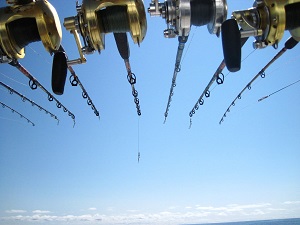Recreational fishers are increasingly targeting sharks and rays, a situation that is causing concern among researchers.
A new study by an international team of scientists reveals that recreational catches of these fishes have gradually increased over the last six decades around the world, now accounting for 5-6 per cent of the total catches taken for leisure or pleasure.
In their paper published in Frontiers in Marine Science, the experts explain that almost 1 million tonnes of fish are being extracted from marine waters by recreational fishers every year. Overall, these recreational fish catches have grown from 280,000 tonnes per year in the 1950s to around 900,000 tonnes in the mid-2010s. Of this total amount, some 54,000 tonnes are comprised of sharks and rays.
“The rise in shark and ray catches started in the 1990s and has been particularly sharp in Oceania and South America,” said Kátia Freire, lead author of the study and a professor at the Universidade Federal de Sergipe in Brazil. “However, we may actually be underestimating the real amounts, as accessing recreational fisheries data is particularly difficult. Most countries do not compile these data or those that do, do not incorporate them into their national fisheries statistics that are reported to the Food and Agriculture Organization of the United Nations.”
The rise in shark and ray catches for recreational purposes is particularly troubling because many species are already threatened by the commercial fishing industry and by illegal fishers.

Recreational fishing. Photo by sbmatherson, Pixabay.
“The problem with sharks and rays is that even if they are thrown back into the ocean, a practice that is not uncommon as many recreational fishers now practice ‘catch-and-release,’ not all individuals survive,” said Daniel Pauly, co-author of the study and principal investigator of the Sea Around Us initiative at the University of British Columbia’s Institute for the Ocean and Fisheries. “For example, 98 per cent of scalloped hammerheads die.”
The biology of sharks makes them slow when it comes to growing and maturing, which means that they produce only a small number of young in their lifetimes. If many individuals are caught before they have been able to reproduce sufficiently, then their population numbers start to dwindle.
Slow growth and late maturation also make increasingly popular recreational practices such as beach-based shark fishing problematic.
“In Australia, a group of recreational fishers lands large tiger sharks and hammerheads from the beach. These large animals are essential to population health and are unlikely to survive the experience of a lengthy fight and subsequently being dragged up the beach,” said Jessica Meeuwig, co-author of the study and director of the Marine Futures Lab at the University of Western Australia. “Given the threatened status of these species globally, such practices are inappropriate.”
Even though information is scarce and disparate, the research team was able to learn about what is being caught and has been caught in 125 countries over the past 60+ years.
“Thus, we have assembled the first comprehensive global estimate of marine recreational catches, which is a major accomplishment,” said Dirk Zeller, co-author of the study and director of the Sea Around Us – Indian Ocean at the University of Western Australia. “Even approximate estimates are better than saying ‘we have no data,’ which translates into ‘there are zero recreational catches,’ a statement that is not true for most countries and that leads to an under-valuation of recreational fisheries and their impact on fish populations.”
The study “Estimating global catches of marine recreational fisheries” was published on January 27, 2020, in Frontiers in Marine Science.
Tags: Daniel Pauly, Dirk Zeller, faculty, Publications, recreational fisheries, Research, Sea Around Us, sharks